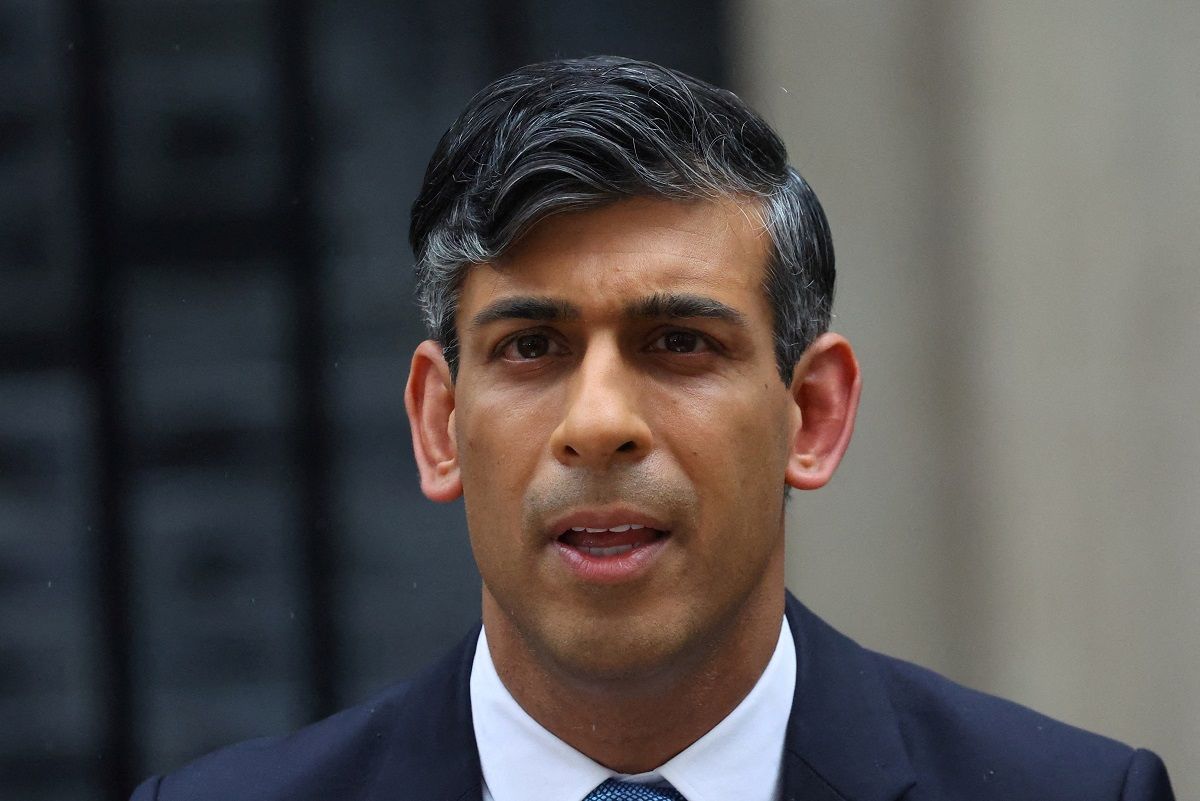
British Prime Minister Rishi Sunak delivers a speech outside Number 10 Downing Street, in London, Britain, May 22, 2024.
11:54 JST, June 18, 2024
LONDON (Reuters) – Britain’s approval of arms export licenses to Israel dropped sharply after the start of the war in Gaza, with the value of permits granted for the sale of military equipment to its ally falling by more than 95% to a 13-year low.
The figures, which have not previously been reported, are based on information provided by government officials to Reuters and data from the Department for Business and Trade’s Export Control unit.
The United States and Germany increased arms sales to Israel after the start of the war with Hamas.
However, the value of British-approved licenses between Oct. 7 and Dec. 31 last year dropped to 859,381 pounds ($1.09 million), government officials told Reuters. That is the lowest figure for the period between Oct. 7 and Dec. 31 since 2010.
This compares with the government approving 20 million pounds of arms sales to Israel for the same period in 2022, including small arms ammunition and components for combat aircraft, according to government data.
In the same period in 2017, the government approved 185 million pounds in arms sales to Israel, including components for tanks and surface-to-air missiles, the data shows, the highest figure for the period in publicly available data going back to 2008.
Unlike the U.S., Britain’s government does not give arms directly to Israel but rather issues licenses for companies to sell weapons, with input from lawyers on whether they comply with international law.
Many of the licenses approved in the period after the start of the war in Gaza were for items listed for “commercial use” or non-lethal items such as body armor, military helmets or all-wheel drive vehicles with ballistic protection.
Reuters could not establish if the fall in the value of approved licenses for Israel was because of a decision by Britain to restrict the sale of certain items, or because there was a drop in demand from Israel.
The Department for Business and Trade, which is responsible for approving the export licenses, and the Foreign Office declined to comment. Israel’s embassy in London did not respond to a request for comment.
RESTRICTIONS
Israel’s conflict in Gaza was triggered when Hamas fighters charged into Israel on Oct. 7 and killed some 1,200 people, according to Israeli tallies. Israel’s subsequent bombardment and invasion of Gaza has killed more than 37,000 Palestinians, according to health authorities in the Hamas-run enclave.
Members of Britain’s parliament and human rights groups have criticized the government for the lack of public information about arms sales to Israel since the start of the conflict.
Some countries such as Italy, Canada and the Netherlands have imposed restrictions on arms exports to Israel because of concerns about how the weapons could be used.
While Germany approved arms exports to Israel worth 326 million euros last year, 10 times more than in 2022, the volume of approvals fell to around 10 million euros in the first quarter of this year.
British Prime Minister Rishi Sunak has been one of Europe’s strongest advocates of Israel’s right to respond with overwhelming force against Hamas.
He has resisted calls to halt arms transfers to Israel but has said the government adheres to a “very careful licensing regime.”
Britain is expected to provide information about arms sales to Israel in the first half of this year in the coming months.
The government has in the past blocked arms sales to Israel, such as in 2009 when it revoked some licenses, and in 1982 when there was a formal restriction after the invasion of Lebanon.
$1 = 0.7885 pounds
Top Articles in News Services
-

Survey Shows False Election Info Perceived as True
-

Hong Kong Ex-Publisher Jimmy Lai’s Sentence Raises International Outcry as China Defends It
-

Japan’s Nikkei Stock Average Touches 58,000 as Yen, Jgbs Rally on Election Fallout (UPDATE 1)
-

Japan’s Nikkei Stock Average Falls as US-Iran Tensions Unsettle Investors (UPDATE 1)
-

Japan’s Nikkei Stock Average Rises on Tech Rally and Takaichi’s Spending Hopes (UPDATE 1)
JN ACCESS RANKING
-

Producer Behind Pop Group XG Arrested for Cocaine Possession
-

Japan PM Takaichi’s Cabinet Resigns en Masse
-

Man Infected with Measles Reportedly Dined at Restaurant in Tokyo Station
-

Israeli Ambassador to Japan Speaks about Japan’s Role in the Reconstruction of Gaza
-

Videos Plagiarized, Reposted with False Subtitles Claiming ‘Ryukyu Belongs to China’; Anti-China False Information Also Posted in Japan


























